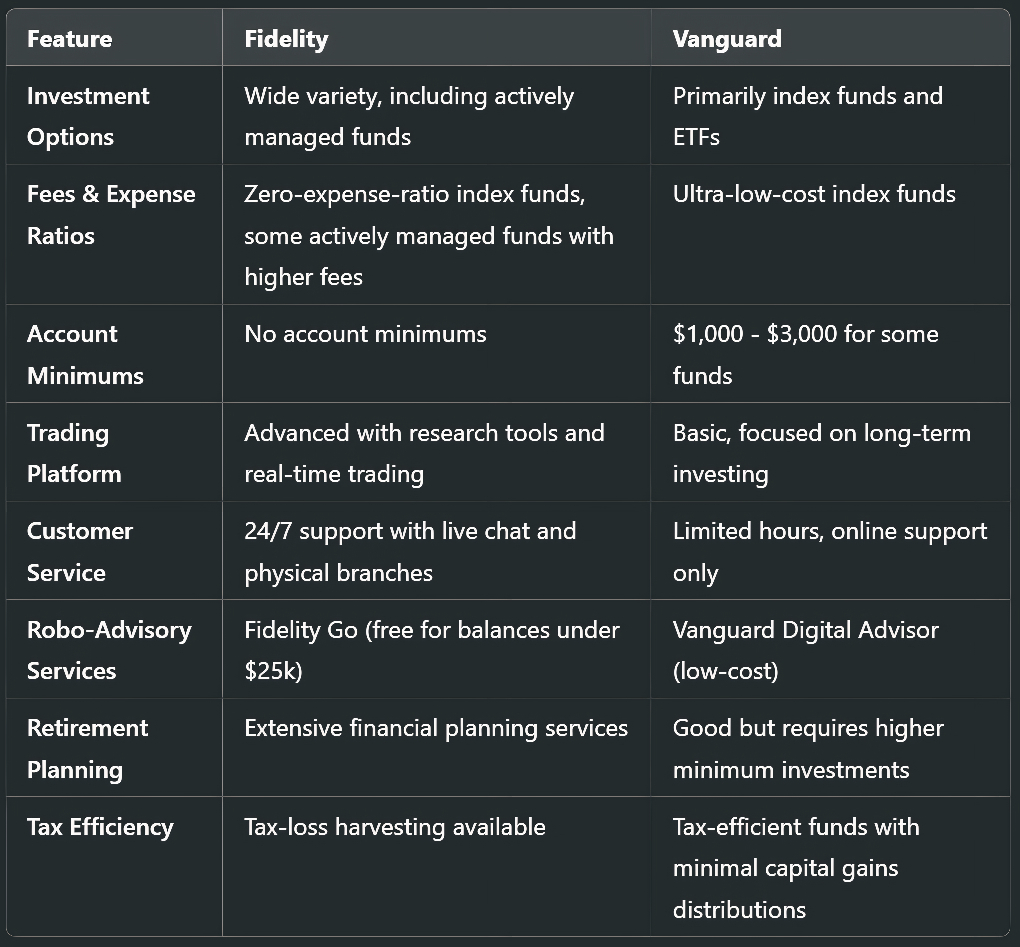
Fidelity vs. Vanguard: Which Brokerage is Right for You?
Fidelity vs. Vanguard: Which investment firm is best for you? This in-depth comparison covers fees, investment options, trading platforms, customer service, and financial planning to help you make the right choice for your financial goals.
BANKING/CASH-FLOWSTOCK OPERATORSTOCK MARKETEDUCATION/KNOWLEDGE
Sachin K Chaurasiya
2/27/20254 min read


When it comes to investing, choosing the right brokerage firm can make a significant difference in your financial growth. Two of the most well-known investment firms—Fidelity and Vanguard—offer diverse services that cater to different types of investors. While both companies are industry leaders, they have distinct approaches to investment management, fees, and customer service. This article provides an in-depth comparison of Fidelity vs. Vanguard to help you determine which is the better choice for your financial needs.
Overview
Fidelity Investments
Fidelity is a powerhouse in the financial industry, known for its innovative investment tools and strong customer service. Established in 1946, Fidelity provides a broad range of investment products, including mutual funds, ETFs, retirement accounts, and individual brokerage services. The company is widely recognized for its user-friendly platform and low-cost trading options.
Vanguard Group
Vanguard, founded in 1975 by John Bogle, is famous for pioneering the low-cost index fund. The firm operates under a unique investor-owned structure, where profits are reinvested to reduce fees for its clients. Vanguard is ideal for long-term, passive investors who prefer a hands-off investment approach with low expense ratios.


Fidelity
Pros
✔ No account minimums, making it accessible for beginners.
✔ Advanced trading platform with real-time research tools.
✔ Commission-free stocks and ETFs.
✔ Strong customer service with 24/7 support.
✔ Comprehensive financial planning services.
Cons
✘ Some actively managed funds have higher fees.
✘ Tax efficiency is not as strong as Vanguard for long-term investors.
✘ Robo-advisor service has higher fees compared to Vanguard’s Digital Advisor.
Vanguard
Pros
✔ Ultra-low-cost index funds with minimal expense ratios.
✔ Strong tax efficiency, especially for passive investors.
✔ Investor-owned models benefit clients by lowering costs over time.
✔ Excellent for long-term and retirement-focused investing.
✔ Low-cost robo-advisory service (Vanguard Digital Advisor).
Cons
✘ Limited trading tools and outdated platform.
✘ No 24/7 customer support, and service can be slow.
✘ Some funds require a minimum investment of $1,000–$3,000.
✘ Not ideal for active traders or those needing hands-on portfolio management.
Hidden Fees or Limitations
While both Fidelity and Vanguard offer low-cost investment solutions, there are some hidden fees and limitations to be aware of:
Fidelity Hidden Fees
Some actively managed mutual funds carry high expense ratios.
Robo-advisory fees for Fidelity Go are higher than Vanguard’s, charging 0.35% for accounts over $25,000.
Account transfer fees may apply if moving funds to another brokerage.
Vanguard Hidden Fees
Some index funds require a high minimum investment ($1,000-$3,000), making them less accessible for small investors.
Commissions for trading non-Vanguard ETFs at external brokerages.
Limited trading tools, making active trading more difficult.
Interactive Tools & Resources
Both Fidelity and Vanguard offer valuable tools for investors to plan and optimize their portfolios. Here are some of the best tools available:
Fidelity’s Tools & Resources
Fidelity Portfolio Analysis Tool: Helps investors evaluate their asset allocation.
Fidelity Retirement Calculator: Estimates how much you need to save for retirement.
Active Trader Pro: An advanced trading platform for real-time analysis.
Tax-Loss Harvesting Tools: minimizes taxable gains for investors.
Vanguard’s Tools & Resources
Vanguard Portfolio Watch: Analyzes portfolio risk and diversification.
Retirement Nest Egg Calculator: Estimates how long your savings will last.
Vanguard Digital Advisor: A low-cost robo-advisor for automated investing.
ETF Cost Comparison Tool: Compares Vanguard ETFs to competitors for cost efficiency.


Who Should Choose Fidelity?
✔ Prefer a user-friendly trading platform with advanced tools.
✔ Want a variety of investment choices, including actively managed funds.
✔ Need 24/7 customer service and physical branch locations.
✔ Seek strong financial planning services without high minimum investments.
✔ Want a feature-rich robo-advisor with flexible pricing.
✔ Require tax-loss harvesting for better tax efficiency.
Who Should Choose Vanguard?
✔ Are a passive investor focusing on low-cost index funds.
✔ Want the lowest possible expense ratios for long-term wealth building.
✔ Don’t mind a basic trading platform in exchange for low-cost investing.
✔ Are comfortable with limited customer service hours.
✔ Prefer a lower-cost robo-advisor for hands-off investing.
✔ Want tax-efficient funds that minimize capital gains distributions.
FAQs
Which is better: Fidelity or Vanguard?
It depends on your investment style. Fidelity is better for active traders, those needing strong research tools, and investors seeking low-cost trading options. Vanguard is ideal for passive investors who prefer low-cost index funds and long-term investing.
Does Fidelity or Vanguard have lower fees?
Vanguard generally has lower fees for index funds and ETFs, while Fidelity offers zero-expense ratio funds and lower costs for active trading. The best choice depends on your investment preferences.
Which brokerage is better for retirement accounts?
Both offer excellent retirement planning tools, but Vanguard is better for long-term, passive retirement investing, while Fidelity offers more hands-on financial planning services with no account minimums.
Does Fidelity or Vanguard have better customer service?
Fidelity provides 24/7 customer service with live chat and physical branch locations, making it a better choice for investors who need assistance. Vanguard has limited customer support hours and no branches.
Can I trade stocks and options with Vanguard and Fidelity?
Yes, but Fidelity is better for stock and options trading due to its advanced trading platform and lower fees. Vanguard focuses more on long-term, buy-and-hold investing.
Is Vanguard or Fidelity better for beginners?
Fidelity is more beginner-friendly due to its zero account minimums, user-friendly platform, and educational resources. Vanguard is better suited for those looking to passively invest with low-cost index funds.
Do Fidelity and Vanguard offer robo-advisors?
Yes. Fidelity offers Fidelity Go, while Vanguard provides Vanguard Digital Advisor. Vanguard’s robo-advisor has lower fees, but Fidelity Go is free for accounts under $25,000.
Which brokerage is more tax-efficient?
Vanguard is known for highly tax-efficient funds that minimize capital gain distributions. Fidelity offers tax-loss harvesting for additional tax benefits.
Both Fidelity and Vanguard excel in different areas. If you’re a hands-on investor who values research tools, excellent customer service, and diverse investment options, Fidelity is the better choice. On the other hand, if your priority is low-cost, long-term investing with a focus on index funds, Vanguard is ideal.
Ultimately, your decision should align with your investment strategy, preferences, and financial goals. No matter which brokerage you choose, both Fidelity and Vanguard offer strong investment opportunities for securing your financial future.
Subscribe To Our Newsletter
All © Copyright reserved by Accessible-Learning Hub
| Terms & Conditions
Knowledge is power. Learn with Us. 📚


